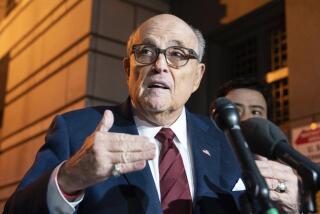Ex-Banker’s Guilty Plea Thrown Out in Iraq Loan Case : Law: The move clears the way for a trial and ends a sentencing hearing that became a forum for accusing the White House of using a scapegoat.
- Share via
ATLANTA — A federal judge on Thursday threw out the guilty plea of an ex-banker accused of arranging $5 billion in illegal loans to Iraq, clearing the way for a full airing of the evidence in a financial scandal that has focused on the Bush Administration’s prewar dealings with Baghdad.
U.S. District Judge Marvin H. Shoob accepted a prosecutor’s request to withdraw the government’s plea bargain with Christopher P. Drogoul, former manager of the Atlanta branch of Italy’s government-owned Banca Nazionale del Lavoro.
Gerrilyn G. Brill, the acting U.S attorney, said that prosecutors and investigators in Atlanta decided to insist on a trial because Drogoul’s testimony at his sentencing hearing this week has been riddled with lies.
The trial cannot occur until well after the presidential election, and the government’s surprise move ended a sentencing hearing that had become a forum for accusing the Administration of trying to make Drogoul a scapegoat to cover up its assistance to Iraq.
Brill also said that prosecutors will file a motion requesting that Shoob be disqualified from presiding at the trial. The judge has been openly skeptical of the government’s contention that Drogoul acted without the knowledge of BNL superiors in Rome, and he said last June that an independent counsel should investigate the case.
Shoob acknowledged that he had formed conclusions about the case, including that BNL Rome and U.S. intelligence agencies knew about the loans to Iraq, some of which financed military purchases.
Bobby Lee Cook, Drogoul’s lawyer, had asked to withdraw the plea two weeks ago, but prosecutors objected. After agreeing to the withdrawal Thursday, he contended outside court that Justice Department officials in Washington ordered the reversal after defense disclosures “uncovered a few raw nerves.”
A department official in Washington said that, when Brill informed the department Wednesday night that prosecutors in Atlanta were considering whether to try to withdraw the plea, she was told it was solely Atlanta’s decision.
Prosecutors have defended their investigation and argued that there is no credible evidence that anyone outside BNL’s Atlanta branch was aware of the four-year scheme that funneled $5 billion in loans to Iraq. Two other Atlanta bank employees who testified at the hearing said they had no evidence that BNL officials outside the branch knew.
Drogoul accepted sole responsibility when he pleaded guilty in June to 60 counts of a 347-count indictment. But on the witness stand Wednesday, he claimed that others in the bank knew of and approved the loans.
Brill said Drogoul’s testimony led to the decision to cancel the plea bargain. “We are prepared and convinced that we can prove him guilty of all of the indictment,” she said.
Congressional Democrats who have criticized the handling of the case welcomed the prospect of a trial. Sen. Patrick J. Leahy (D-Vt.) said a trial is “the only way the American public will learn the truth about the bank scandal.” Rep. Henry B. Gonzalez (D-Tex.) said a trial will disclose the full extent of the Administration’s Iraq policy.
Since the sentencing hearing began Sept. 14, Cook had suggested that the Justice Department in Washington had interfered with the Atlanta prosecutors as part of an Administration cover-up of its dealings with Iraq.
On Wednesday, Cook introduced in court an internal BNL report that described lobbying of U.S. officials by Italy’s ambassador in the spring of 1990. The report said the ambassador even pressed then-Atty. Gen. Dick Thornburgh not to indict the bank. Thornburgh has said that he does not recall such a meeting.
Documents provided Thursday to The Times show that BNL officials in Rome feared the bank was on the verge of being indicted that spring. The officials believed that the threat came from the Justice Department, rather than prosecutors in Atlanta.
“The government could not stand idly by while the largest bank in Italy--controlled by the Treasury Ministry--suffered such an indictment,” a senior BNL official told the U.S. Embassy in Rome on March 15, 1990, according to a State Department cable.
Two days later, Italian Ambassador Rinaldo Petrignani met with senior Justice Department officials to express the same concern, the internal BNL report said. At the end of March, the ambassador reportedly met with Thornburgh.
Internal Justice Department documents indicate that the Justice Department was considering criminal charges against the bank then.
On Feb. 23, 1990, Atlanta prosecutor Gale McKenzie wrote a memo to her supervisor in which she said a senior department lawyer in Washington had said that charges against the bank were under consideration.
“It has always been this office’s position that BNL is the victim of this massive fraud rather than a potential subject,” McKenzie wrote.
Deputy Atty. Gen. Laurence A. Urgenson said in an interview that the department considered indicting the bank in the spring of 1990, but eventually agreed with Atlanta prosecutors that the bank was a victim. He also said prosecutors on the case were never told of the Italian lobbying effort.
“The meetings that are recounted in that BNL document were news to me and to the prosecutors in Atlanta,” Urgenson said.
Stanley reported from Atlanta and Frantz reported from Washington.
More to Read
Sign up for Essential California
The most important California stories and recommendations in your inbox every morning.
You may occasionally receive promotional content from the Los Angeles Times.










